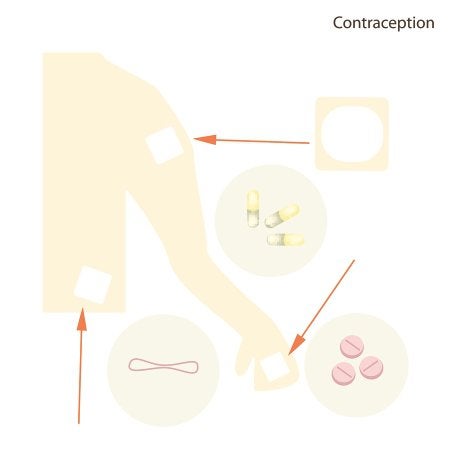-
How Men Can Support Their Partners Before and After a Pregnancy Termination
When men choose to be active supporters of their partners before and after a pregnancy termination, there are many things they can do to be helpful. One of the best things men can do is be proactive about asking their partners about the kind of support they need and then following through on providing it. These tips can also help you be supportive before and after an abortion .

Provide Practical Support
There are many logistical things that can become issues before and after a pregnancy termination, so find out from your partner how you can help. Discuss the costs of the termination and how you can help share some of the financial burden. Make plans for dealing with things like household responsibilities as your partner recovers. Your partner will also need a ride to and from the clinic, perhaps on more than one occasion, so make plans to adjust your work schedule accordingly so you can be there. There may be concerns your partner has about juggling responsibilities as she goes through the abortion process that may not be obvious to you, so ask her what kind of help she needs.
Provide Emotional Support
No matter how confident you feel about your decision to terminate a pregnancy, it is natural to experience some emotional upheaval after the event. Some people feel guilty that they feel relieved, and others may feel sadness, even if they believe they made the right choice. Ask your partner to discuss her feelings openly. Often, simply listening and letting your partner know you’re always there to provide support is enough.
Care for Yourself
Men also experience a range of emotions after a pregnancy termination, so remember to look after your own needs as well. If you don’t, you won’t be able to be as supportive as you want for your partner. Sometimes, it can be helpful to have someone other than your partner to discuss your feelings with, especially if your partner is very emotional about the decision.
If you are facing an unwanted pregnancy, Washington Surgi-Clinic is here to help. Contact us today at (202) 659-9403 to find out more about pregnancy termination in Washington, D.C. and to schedule a consultation.
-
Get the Facts About Emergency Contraception
If your birth control method failed or if you had intercourse without protection, emergency contraception could help to prevent an unwanted pregnancy. Some methods of emergency contraception are available over-the-counter, and some may need to be prescribed by your gynecologist . Here are the facts you need to know.

What is emergency contraception?
Emergency contraception is contraception that is used to prevent pregnancy after intercourse has already occurred, as opposed to other birth control methods that are used before intercourse. The amount of time a woman has to take emergency contraception after intercourse varies depending on the method chosen. It is important to note that emergency contraception is not the same thing as the abortion pill. It will not end or harm an existing pregnancy. Instead, it makes it difficult for a pregnancy to occur.
What types of emergency contraception are available?
Most emergency contraception comes in pill form. Plan B, One-Step, and Next Choice are all pills that contain the hormone levonorgestrel. Anyone over the age of 17 can get these pills without a prescription. Younger women need a prescription in most states. Ella is another emergency contraceptive pill. It contains ulipristal acetate and must be prescribed by a gynecologist. Copper IUDs can also be used as emergency contraception and must be placed by a gynecologist. In some cases, taking a higher dose of birth control pills can work as an emergency contraceptive, but always do so under the guidance of your gynecologist.
When should I take an emergency contraceptive?
Take an emergency contraceptive as soon as you can after unprotected sex. It is possible for the contraceptives to work for up to five days after intercourse, but the longer you wait, the less effective they become. Keep in mind that emergency contraceptives do not protect against sexually transmitted diseases. Talk to your gynecologist about STD testing if you have had unprotected sex.
Washington Surgi-Clinic can help you navigate decisions about emergency contraception and STD testing after unprotected intercourse. To make an appointment to find out more about birth control methods in Washington, D.C., please call (202) 659-9403.
-
Is the Birth Control Patch Safe and Effective?
If you are looking for a birth control solution, one option your gynecologist may discuss with you is the birth control patch. The patch works similarly to the birth control pill, but without the need to remember to take it the same time each day.

The patch is an extremely effective method of birth control. Because you apply a patch to your skin and leave it in place for three weeks, it removes most of the risk of using it incorrectly or forgetting to take a pill. Approximately one out of 100 women will become pregnant each year if they use the patch exactly as directed. That number rises to nine in 100 when the patch is not used correctly. It is safe for most women, but it is not ideal for women with migraines with aura, heart valve problems, lupus, or who smoke. Your gynecologist will help you evaluate all of your options for birth control so you can make the best choice for you.
Washington Surgi-Clinic offers comprehensive women’s health services, including gynecological checkups, birth control consultations, and STD testing in Washington, D.C. Call (202) 659-9403 to make an appointment with a provider.
-
A Quick Overview of Pap Smears
Having a regular Pap smear is an important part of preventative healthcare for women. The test is performed by your gynecologist and takes just minutes. This video explains more about the process.
During a Pap smear, your gynecologist will remove a sample of cells from your cervix with a small brush. These cells are screened for abnormalities that could indicate cancer. The test is performed in the doctor’s office and does not require any anesthesia. Mild discomfort is possible for a few seconds when your gynecologist brushes the cervix, but it resolves immediately after the test.
At Washington Surgi-Clinic , we offer comprehensive gynecology services in Washington, D.C. with a complete commitment to patient confidentiality. To make an appointment with a gynecologist today, please call (202) 659-9403.
-
Is a Nonsurgical Pregnancy Termination Right for You?
If you choose to have a pregnancy termination during the first trimester, a nonsurgical abortion, also called a chemical abortion, may be an option for you. There are several different factors involved in choosing the right method of termination, and your gynecologist can help you decide which option is the best for your situation. Here is a look at nonsurgical pregnancy termination and some signs that it could be the right choice for you.

What is nonsurgical pregnancy termination?
Nonsurgical termination uses medications to end the pregnancy rather than a surgical procedure. There are a few different medications your gynecologist can use, depending on the stage of your pregnancy. They can be administered orally, vaginally, or via an injection, and typically, the medications are taken in two parts. You will take the first medication at your doctor’s office and then take the second at home days later, as prescribed by your doctor. After taking the dose of medication at home, you will experience cramping as the fetus is expelled. About a week after taking the second dose of medicine, your gynecologist will perform an exam to ensure the abortion is complete.
Who can have a nonsurgical termination?
Nonsurgical termination is only used for first-trimester abortions in pregnancies less than six weeks old according to menstrual age. Menstrual age, also sometimes called gestational age, is the duration of the pregnancy measured from the first day of your last period. This is different from the conceptional age, which measures the length of your pregnancy starting from the time of conception.
Who is not a good candidate for nonsurgical termination?
Anyone further along in her pregnancy than six weeks cannot have a nonsurgical termination. Women who are anemic or who have liver, kidney, bowel, or seizure disorders may not be able to have non-surgical termination, as it could cause dangerous complications. Your gynecologist will consider your medical history when recommending the right procedure to you.
Get the information you need about your abortion options at Washington Surgi-Clinic. We offer safe and confidential first and second trimester abortions in Washington, D.C. , with complete support throughout the process. Make an appointment by calling (202) 659-9403.
-
How to Talk to Your Teenage Daughter About Sexual Health
Mothers play a central role in shaping their daughters’ knowledge of and attitudes about sexual health. Having the talk isn’t always easy, but it is important. By having open communication with your daughter, you can help her protect herself from STDs and unwanted pregnancies and see going to the gynecologist for checkups as a normal part of well-being. Although the conversation can be tricky, these tips will help you get started.

Don’t Wait for the Right Moment
There is no perfect time to start talking to your teen about sexual health. Instead of waiting for the exact right moment, seize on opportunities that arise. Something on a television show or movie or a snippet of an overheard conversation can be all that you need to broach the subject. Your daughter may be resistant to having the conversation, but the message you want to deliver will still get through. Keep bringing up the subject when you see an opportunity, as sexual health should be an ongoing conversation as your teen daughter grows.
Get Real About the Pressures
You may not want to think about the pressures your teen is likely to be facing, but ignoring them could put your daughter at risk. Be upfront and honest as you discuss issues of sexual activity, STDs, and birth control pills. Tell your daughter how to protect herself and how to get help if she thinks she needs STD testing or could have an unwanted pregnancy.
Involve a Gynecologist
Your daughter should have her first gynecology checkup by age 18—or earlier, if she is sexually active. Help your daughter find a gynecologist she feels comfortable talking to, and give her the freedom to talk to the doctor on her own about her sexual health concerns.
The compassionate team at Washington Surgi-Clinic offers supportive care to women of all ages for everything from Pap smears to STD treatment and pregnancy termination in Washington, D.C. For an appointment, please call (202) 659-9403.
-
Signs of Cervical Cancer
It is possible for a gynecologist to detect early cervical cancer and pre-cancerous changes by performing a Pap smear. Routine Pap tests can save lives, especially since cervical cancer often does not cause unusual symptoms in its early stages. By the time the symptoms develop, the cancer is typically already in an advanced stage.

These signs and symptoms are generally localized, such as pain during sexual intercourse, and an abnormal vaginal discharge that may occur between periods and may contain blood. Abnormal vaginal bleeding is another possible sign of cervical cancer. It may occur after douching, after a pelvic exam, after vaginal sex, between periods, and after menopause. Systemic health problems can also occur when cervical cancer spreads. These include fatigue and unintentional weight loss.
Women can schedule an exam and Pap smear in Washington, D.C. at Washington Surgi-Clinic. Call us at (202) 659-9403 and visit us online to read about our other women’s health services, including HPV treatment and pregnancy termination.
-
How Are Due Dates Calculated?
Using birth control methods such as pills as prescribed by your gynecologist is an effective way to prevent unintended pregnancies. But it’s important to remember that it’s still possible for an unintended pregnancy to occur, especially if you miss a few days of pills. If you think you might be pregnant, you should see a gynecologist right away for a lab test. The estimation of your due date will be a significant factor in determining which type of pregnancy termination is available to you.
Watch this video for an introduction about calculating due dates. This doctor explains that your due date is calculated from the first day of your last period. From this point, you can count 280 days forward to arrive at an estimated due date.
The gynecologists at Washington Surgi-Clinic provide safe and legal chemical pregnancy terminations up to six weeks’ gestation, as well as surgical pregnancy termination. You can learn more about pregnancy termination near Washington, D.C. by calling (202) 659-9403.
-
Using the Birth Control Patch Correctly
The birth control patch releases a combination of hormones to prevent unintended pregnancies. It works by preventing ovulation, and altering the uterine lining and cervical mucus. For many women, the patch is an ideal birth control method because it doesn’t involve remembering to take a pill at the same time every day. For maximum effectiveness, it’s important to follow the prescribing instructions as given by your gynecologist or pharmacist.

Applying the Patch
The birth control patch must be applied to clean, dry skin that is free of lotions, powders, and other products. Press the patch to your skin firmly for 10 seconds and ensure the edges adhere well to your skin. You can place the patch on your stomach, buttocks, upper back, or the outside of your upper arm. Avoid placing it over irritated or broken skin, or where it will be underneath tight clothing such as a waistband. Your gynecologist will instruct you to either apply the patch on the first Sunday after the start of your period or on the first day of your period.
Discarding the Patch
Each patch is worn for seven days . After removing an old patch, fold it in half and discard it in a manner that makes it inaccessible to children and pets. It should not be flushed. You should remove the old patch and apply the new one on the same day each week for three consecutive weeks. After three weeks, remove the old patch and do not apply a new patch for seven full days. This is the week that you will have your period.
Following Special Instructions
Your gynecologist may ask that you check the patch every day to ensure it is still adhering well to your skin. If it becomes loose, discard it and apply a new patch. If you are referred for any medical tests, surgical procedures, or bed rest, inform the provider that you’re using the birth control patch. You may be advised to discontinue its use temporarily. It’s recommended that women avoid consuming grapefruit, grapefruit juice, and other grapefruit products while using the patch because these may interfere with its effectiveness. Women should not smoke while using hormonal birth control due to the risk of blood clots.
You can discuss the various birth control methods available in Washington, D.C. by scheduling an appointment with a gynecologist. Call Washington Surgi-Clinic at (202) 659-9403. Our clinic is dedicated to maintaining the strictest standards of patient confidentiality.
-
Understand Your Reproductive Rights: A Quick Look at Roe v. Wade
Roe v. Wade is among the most well-known Supreme Court cases because it affirmed the reproductive rights of women in the U.S. The right of women to obtain pregnancy terminations has long been a controversial subject. Because of this, it is important for every woman, currently pregnant or not, to understand her right to have a pregnancy termination performed in a safe, legal manner by a gynecologist.

Case Background
In 1971, Norma McCorvey filed a case against the District Attorney of Dallas County, Henry Wade. In the court documents, McCorvey was identified as “Jane Roe.” At the time, Texas prohibited abortions except in cases where it was necessary to save the patient’s life. To fully understand this issue, it’s helpful to go back further in time. Abortion was legal in the U.S. at the country’s founding. It only became a subject of legal restrictions in the mid-1800s. But many states began reforming these restrictive laws and by the 1960s, pregnancy termination was more widely accessible in 17 states. Yet, countless women still did not have access to safe, legal pregnancy termination services—because of both financial and legal restrictions. Low-income, minority women were disproportionately affected. According to the Guttmacher Institute , abortion was the official cause of death for 2,700 women in 1930 because of the lack of healthcare accessibility.
Supreme Court Ruling
In 1973, the Supreme Court ruled that the Fourteenth Amendment’s guarantee of personal liberty and privacy extended to a woman’s right to decide whether to bear a child. Roe v. Wade has undoubtedly helped to save the lives of countless women who otherwise would have tried dangerous methods to end pregnancies.
State Laws
Each state establishes its own pregnancy termination regulations. Some, for example, require the consent of a parent if the patient is legally a minor. Washington, D.C. does not have restrictive abortion laws. As of January 2017, the only restriction in the District of Columbia is a prohibition on public funding of abortions. However, public funding is still available in cases of rape, incest, and life endangerment of the mother.
The gynecology team at Washington Surgi-Clinic firmly believes that every woman should have access to high-quality healthcare delivered by compassionate providers . We provide nonsurgical and surgical pregnancy terminations in Washington, D.C. Call (202) 659-9403 to request a confidential appointment to discuss a first or second trimester abortion.
Recent Posts
Popular Posts
categories
- Uncategorized
- STD
- Washington Surgi-Clinic
- Abortion
- Pregnancy
- Pap Smears
- Birth Control Options
- HPV
- Gynecologist
- Pregnancy Test
- Abortion Safety
- IUD
- Pregnancy Termination
- First Trimister
- Cervical Cancer
- Morning After Pill
- Birth Control Pills
- Chlamydia
- Birth Control Shot
- Gonorrhea
- STD Testing
- Birth Control Implant
- Pelvic Pain
- Birth Control Patch
- HIV
- HPV Vaccine
